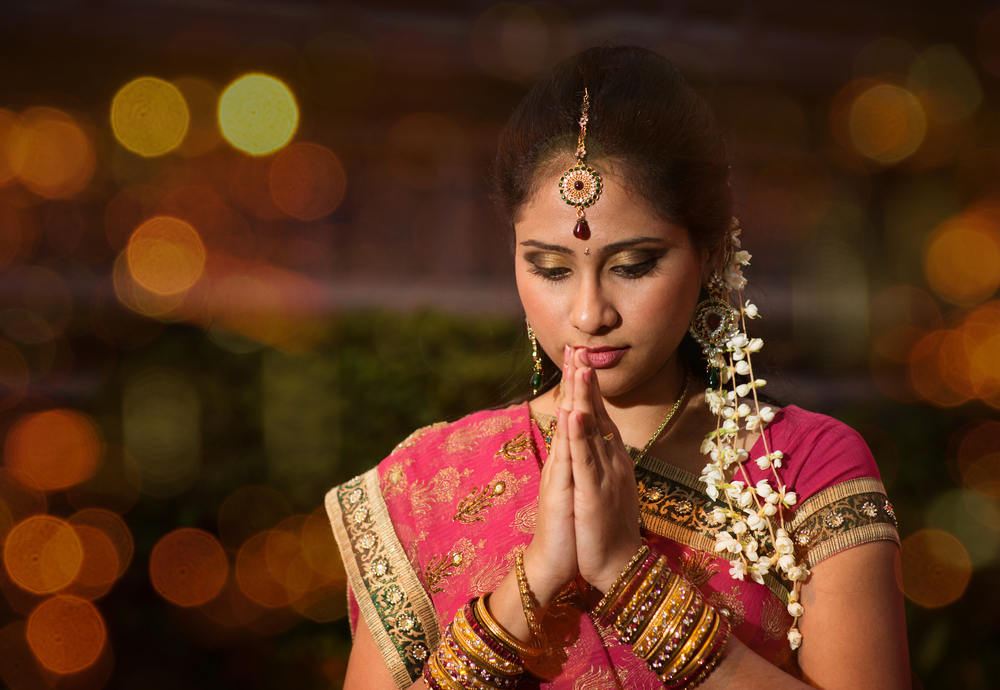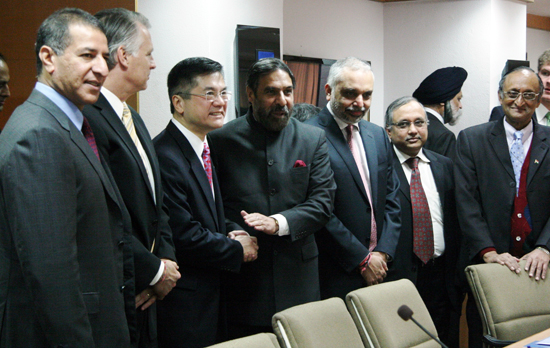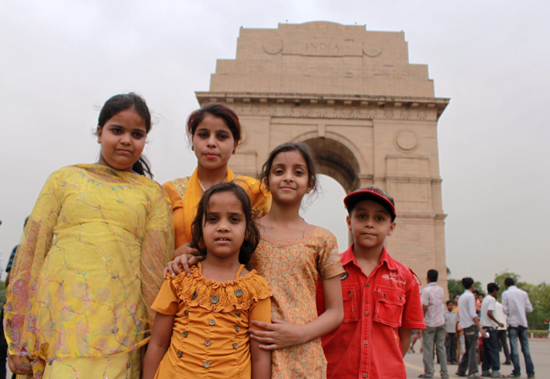Culture and Society: Greetings and Courtesies
General
India is a strongly hierarchical culture in which greetings and courtesies are influenced by religion, age, gender, and the caste system. Although not as dominant today, caste traditionally organized Indian society into a rigid pecking order and modern etiquette remains rooted in it. Even exchanges between friends and family members are typified by deference and humility.
English is an official language of India and widely spoken, so it is customary for people to greet one another and converse in this language as much as any other.
Informal Greetings
When greeting one another and saying goodbye informally, North Indians say Namaste and South Indians Namaskar while nodding their heads and pushing their palms together so that their fingertips touch their chin. A vague bow is added when encountering an older or socially senior person who, in a group context, is always greeted first. Younger city-dwellers who have been exposed to Western culture often use the English Hi and Hello and wave their hands. Shaking hands is also permissible, but an Indian man would typically wait for an Indian woman to extend her hand before taking it. Even in an informal setting, a Muslim Indian man would never touch a woman for fear of seeming morally presumptuous. Muslims typically greet each other with Salaam (Peace) while raising their right hand, palm facing their interlocutor.
In informal social circles, North Indians of the same age tend to use one another’s first (of many) names or a shorter form of that name, while South Indians who often lack surnames tend to call each other by the initial of their father’s name. Names are often suffixed with -ji, (e.g., Govind-ji or Ardu-ji), a term of familiarity and companionship. Even in informal situations, a younger Indian will usually add Aunty or Uncle to the first name of an older person (e.g., Aunty Priya, Uncle Vijay). Teachers and professors are often addressed as Sir or Ma’am.
An Indian man might informally ask a woman, Tum kaisi ho? (How are you?), or another man, Tum kaise ho? (How are you?), to which the correct response would be Maim. Accha hum (I’m fine thanks. And you?). To informally introduce oneself, one would say, Tumhara nam kya hain (What is your name?). An appropriate reply would be, Mera nam ___ hain (My name is ___). After introductions have been made, Indians might say Ap se milkar khushi hui (A pleasure to meet you) and Svagat hain (Welcome). At the end of an informal encounter, Namaste can be used to bid goodbye, as well as Ap ka din accha bite (Have a nice day).
Formal Greetings
In formal situations, handshakes are less frequent, especially between men and women. The word Namaste is usually followed by Subh prabhat (Good morning), Subh dhin (Good afternoon), or Subh sandhya (Good evening) depending on the time of day. Namaskar is sometimes used in both North and South when addressing a person of importance. The hand gesture accompanying Namaste/Namaskar is identical to the informal use.
Social capital and prestige underpin Indian culture, so VIPs expect to be addressed as Shrimaan (Mr), Shrimati (Mrs), or Kumaari (Miss), derived from honorifics applied to Hindu deities. The English Sir and Madam are also acceptable, as is the use of a professional title (Doctor, Professor, Chairman, etc). These titles are spoken in English rather than Hindi. When an Indian has become more familiar with a superior, he or she may use the suffix -sahab (e.g., Doctor-sahab, Professor-sahab).
An Indian person greets a man formally with Ap kaise hain? (How are you?) and a woman with Kaisi hain ap? (How are you?) to which an apt reply would be Maim thik hum, dhanyavad, aur tum? (I’m fine thanks, and you?). In formal contexts, an Indian will bid farewell to every member of the group before departing, saying Phir milenge (Goodbye). If he or she is going far then others in the group may say Api khi yatra sukhad ho (Have a good journey).
Business Greetings
As with all other areas of Indian culture, respect and knowing one’s place are essential to successful business greetings. It is customary for elder, higher-ranking businesspeople to be introduced first in conferences and gatherings. One tends to use the honorifics mentioned above, although the globalized corporate culture means that English titles such as Mr., Mrs., CEO, Senior Manager, and others, are gaining prevalence. Globalization and the practice of better-off Indians heading to the West for their education has made shaking hands (even between the sexes) an essential part of business greetings.
Business cards are often exchanged during a first meeting and are translated into the other party’s language as a sign of courtesy and willingness to assist.
Conversation Topics
The subcontinent has a rich tradition of language, literature, and public debate, and even the least-educated Indians love to express their opinions. Total strangers will often spark up conversations with one another on public transport, not afraid to voice honest, forthright opinions. Inquiring about someone’s personal life (family, income, etc.) is usually seen as caring and considerate. While directly expressing difference of opinion is not always welcome, it is usually permissible for a person who is older or socially higher to do so.
India is a sporting, artistic, and cultural powerhouse, so its citizens love to discuss cricket (the national obsession), Bollywood movies, music, and celebrity gossip. Since India liberalized its economy in the 1990s, interest in business issues has spread across all sectors of society. Indians are proud of their civilization’s rich history and are, by and large, happy to talk about this at any time.
Taboos
In short, any uttering or gesture that challenges the hierarchy and propriety of Indian society is taboo. Indian men never initiate a conversation with a lone woman, as this is usually interpreted as suggestive. Most religions in India hold the privacy of women sacred and abhor any suggestion of their promiscuity. Touching between men and women in public places is usually banned unless in the exceptional circumstances given above. On a similar tip, winking and whistling are regarded as sexually suggestive.
Failure to use the polite forms of address for VIPs is considered offensive and compromises personal and business relationships.
Pointing with the finger during any kind of greeting is unacceptable, for it is viewed as accusatory.
Placing one’s hands on one’s hips is likely to be construed as a belligerent posture.
Article written for World Trade Press by Tom Sykes.
Copyright © 1993—2025 World Trade Press. All rights reserved.

 India
India 

